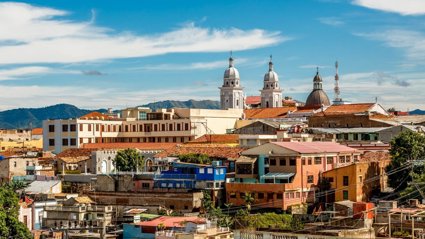
Rob Potter Award
The Rob Potter Award offers £1,500 to a post-PhD early-career researcher studying the geographies of development.
About the Award
The Rob Potter Award is given in celebration of Rob Potter, an eminent human geographer and founding editor of Progress in Development Studies.
Every year, a grant of £1,500 will be given through the Society’s Small Research Grants scheme, either as a supplement or as an independent award.
In tribute to Rob, the project to be recognised by the Award will have a focus on:
-
Geographies of development (especially urbanisation, housing and participatory planning, and socio-economic development)
-
Transnational migration and identities
Preference will be given to research on the contemporary Caribbean, with studies of Mexico, Latin America and small island nations also welcomed.
Rob Potter (1950-2014) was Emeritus Professor of Human Geography at the University of Reading, and a distinguished academic expert on urban geography and the geographies of development, with particular reference to the Caribbean. His research focused on urbanisation, planning, housing, tourism, heritage, race, gender and returning migrants. A tribute to Rob Potter, by his colleague and friend Professor Dennis Conway, can be read here.
Deadline: 3 February
Apply now
The Rob Potter Award is given through the Society’s Small Research Grants scheme. All prospective grant applicants are encouraged to read our Advice and Resources pages, which include more information about the grants programme, its conditions, how to apply for a grant and what is expected if your application is successful. Please read this information carefully and send your application, or any enquiries, by email to grants@rgs.org.
Previous recipients
2023: Dr Andrew Papworth (University of York): 'Land grabs on the Caribbean Coast of Nicaragua: challenges and solutions for the Rama indigenous group'
The Rama are an indigenous group who live in the southern autonomous region (RACCS) of Nicaragua. Legally, they have the exclusive right to use the resources in their territory. Despite this, Pacific Nicaraguans have increasingly colonised the Rama territory through land grabs, which has led to extensive environmental destruction and the degradation of natural resources. The current
extent of this problem and the impact it is having on Rama livelihoods are currently unknown. This project will seek to address this through remote sensing, and interviews and participatory methods in one Rama community.
2022: Dr Anna Laing (University of Sussex): 'Towards Decolonising Climate Financing Spaces: An exploration and advancement of the Indigenous-led Shandia Vision, Amazon Basin'
This project investigates Indigenous-led climate financing mechanisms, as a key aspect of broader climate justice struggles and effective climate mitigation policy and practice. This research will examine and amplify the principles and mechanisms of one Indigenous-led climate financing initiative, the Shandia Vision, as positioned by COICA (the Coordinating Body of Indigenous Organisations in the Amazon Basin). It will do so at a unique moment – when Indigenous movements worldwide have called out the ‘climate finance gap’ at COP26 and are seeking to strengthen their own sovereignty over climate change decisions and funding ecosystems.
2020: Meiyun Meng (Birkbeck, University of London): 'Highly Educated Female Migrants’ Production of Home Spaces and Their Negotiations of Gendered Power in Contemporary Shenzhen'
Highly educated females have been overlooked in geographies of ‘home’ and internal migration in China. This study will investigate how their production of home spaces offers new insights that can advance understandings of female migrants’ identity formation and place-attachment, particularly in Shenzhen, a rapidly developing city with high rates of migration. Drawing on cognition mapping and semi-structured interviews with highly educated female migrants in Shenzhen, this project aims to explicate the interactions between their self-identifying process and negotiations of gendered power through everyday home-making practice.
2018: Gemma Sou (University of Manchester): ‘Disaster recovery policy processes in postcolonial contexts: life-work histories in the Caribbean’.
This project adopts a life-history method to investigate the extent to which government officials in postcolonial societies reify, transform, build on, or resist colonial narratives that authority, expertise and knowledge are located in the ‘West’ when engaging in national disaster recovery policy processes. Using the case of Antigua and Barbuda following Hurricane Irma in 2017, the research will contribute to debates about how to implement post-disaster recovery that is locally led, appropriate and sustainable.